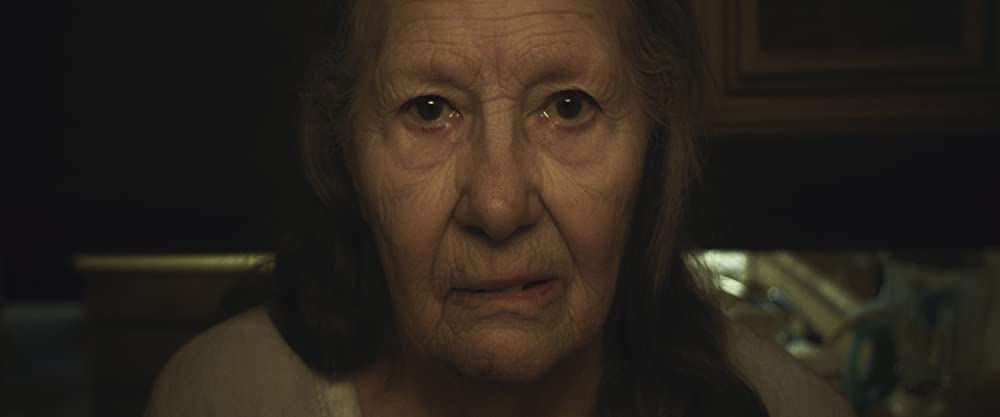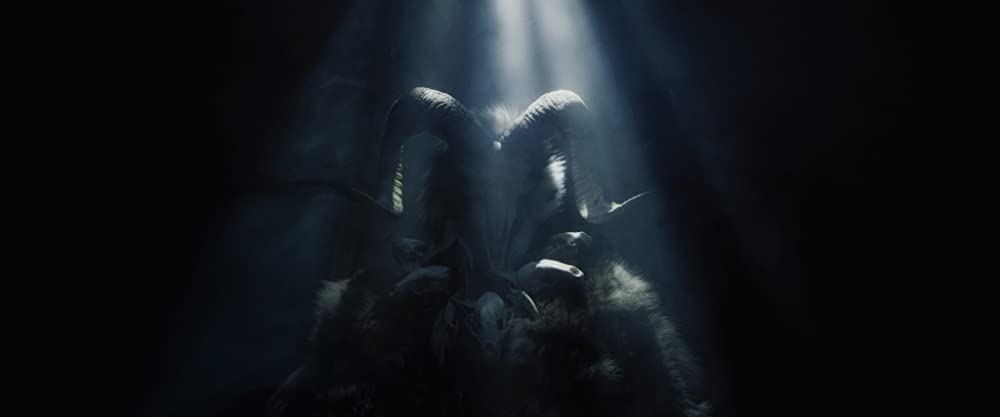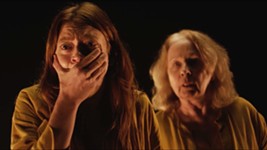Into the Woods, In Search of Sator
The secret family history behind Jordan Graham's supernatural horror
By Richard Whittaker, 12:30PM, Sat. Apr. 10, 2021

Sator is real. At least, that's what June Peterson believed. It was her belief in a spirit that communicated with her that became the core of Sator, the supernatural woodland horror created by her grandson, Jordan Graham.
The film came from frustration. In 2012 Graham released his first film, Specter "I never really liked that film," he said. "I didn't like the process, and I wasn't proud of that film, so I went, 'Well, I'm going to do one thing that I give my all to." Inspired by Jeremy Saulnier's DIY approach to getting Blue Ruin made, he started filming, and seven years later Sator is now available on VOD.
It's a bleak, dread-filled story of a grandson, Pete (Michael Daniel), dealing with the declining mental health of his grandmother (June Peterson, Graham's actual grandmother), and her decades-old obsession with a figure she claims lives in the woods and communicates with her through whispers and voices only she can hear. But Pete soon discovers that Sator may not be solely a symptom of her dementia.
Pete's path of discovery echoed Graham's own experience of finding the film's story. "Sator wasn't even part of the film until I was in post-production," said Graham. He'd known about that part of his family history before: that his grandmother believed she had a protective spirit called Sator. "As a quick cameo, I told Michael to bring up spirits, and that's when she started talking about the voices in her head, and how they used to communicate with her through automatic writing." Suddenly, the old story was thrown out, and Graham started using that improvised scene as the core of what would become Sator.
His life and the film became inextricably intertwined, as he found out more and more about what had happened to his grandmother. "She was quite a character," he said. Fascinated with spiritualism, she tried rewriting the Book of Revelation for children, "to allow them to understand it better. … She had a black widow spider in the house, and when we would go out for dinner, she would talk about how she would have to get back and feed it." As for Sator, she first became aware of its presence in July 1968, "and then her obsession with him led her into a psychiatric hospital for schizophrenia." The deeper Graham dug, the more he found a history of hearing voices, and terrible costs his family had paid - his great-great-grandmother was also committed, and his great-grandmother committed suicide when his grandmother was 4. "I never knew of that whole history before I made this film."
In hindsight, that turned out to be the easy part as, after four years of on-and-off filming, he entered three years of postproduction. On-set, he'd been writer, director, and cinematographer, as well as handling special effects, but with basically zero budget to hand, he basically had to do everything left to be done. "I'd been editing forever, but doing certain special effects stuff, learning how to color grade, learning how to record sound and mix sound, I had to take it one step at a time, learn that software, and once I finished that process going on to the next thing."
This was also when he learned what he hadn't known during the actual shoot. Several key scenes take place in the snow, and he knew that he needed neutral density filters for his camera to cut out the UV. "I didn't have money to spend on nice filters, so I went on eBay and bought the cheapest ones I could to fit my lenses. But what I realized was that each one of them had just a tint of a different color. So when I'm out there in the snow, one lens will have a little bit of purple, one lens will have a little bit of green, one lens will have a little bit blue on them. So when there's a little tint of blue compared to the purple, it was so frustrating trying to color-match the snow."

The learning curve became a blur, as he discovered when he was recently invited to write an article for No Film School about one detail from years earlier in the process. "I was trying to recreate how I colored something, and I totally forgot that software, so I had to relearn an aspect of it just so I could accomplish one thing."
But if Sator evolved heavily during shooting, Graham had an underlying idea for the mood he wanted to strike in the final film. "I wanted to put the audience in a trance," he said. "I didn't want to let go of that, and it's definitely not a happy film, so I wanted to lead you into the dread."
One point of emphasis for him was the sound mix, and he was very inspired by No Country for Old Men. "They don't really use any music, and I wanted to make everything as quiet as possible so you don't know when something's going to pop out at you." Another influence was The Blair Witch Project: "The sound of sticks breaking and rocks dropping actually sounds like it's far away, compared to the newest Blair Witch film, which sounds like a bunch of prerecorded studio sound effects that don't give you that feeling of 'Wow, something's really in the forest.'" Ultimately, he decided to re-record the entire sound mix (except for the improvised conversations with his grandmother) as ADR - a process that took 16 months and a lot of ingenuity, as he decided to not use a sound library. "Me not having a ton of money, I had to do this in my mother's garage in a foley pit that I made from 11 o'clock at night until 4 o'clock in the morning, because that was the quietest I was able to record."
Sator is available on VOD now.
A note to readers: Bold and uncensored, The Austin Chronicle has been Austin’s independent news source for over 40 years, expressing the community’s political and environmental concerns and supporting its active cultural scene. Now more than ever, we need your support to continue supplying Austin with independent, free press. If real news is important to you, please consider making a donation of $5, $10 or whatever you can afford, to help keep our journalism on stands.
May 16, 2025
Sator, VOD, Supernatural Horror, Jordan Graham








